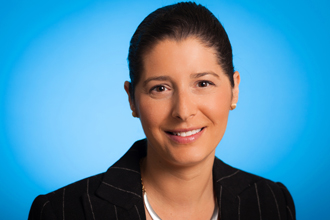A ‘one-size-fits-all’ approach to genetic testing is not appropriate, study suggests

By Ana Gajic

Dr. Yvonne Bombard
There are Information Enthusiasts, some are Contemplators, and others are Reassurance Seekers.
Patients’ approaches to genome sequencing might be as varied as their genetic codes, suggests a new study, which identified five profiles that reflect different approaches to making decisions about genome sequencing.
The study, published today in the European Journal of Human Genetics, is based on research led by Dr. Yvonne Bombard and Chloe Mighton, researchers at the Li Ka Shing Knowledge Institute.
Sequencing is a genetic test that can help diagnose conditions such as hereditary cancer syndromes. It can also provide patients with a large volume of information about their risks for thousands of diseases that are not related to the reason they are having genome sequencing, referred to as incidental results.
While it’s recommended that patients have pre-test genetic counselling to decide which types of incidental results they would be willing to learn about, the amount of extra results that could come up and require discussion put a strain on the health-care system’s already limited genetic resources. Some patients also may not be interested in learning all of the incidental results.
“We set out to study how adult cancer patients make decisions about learning incidental results from genome sequencing,” Dr. Bombard said.
“Based on our interviews, we found that groups of patients shared common values and concerns about incidental results. We then characterized patient profiles based on the factors that informed their decisions about learning incidental results.”
The researchers conducted interviews with adults participating in a randomized controlled trial of a decision aid called the GENOMICS ADvISER. The group identified five patient profiles. Patients that aligned with each profile described specific values, concerns, uses of incidental results, and contextual factors — such as life stage, family considerations and health experiences — that they considered when making decisions about the types of incidental findings they would want to learn.
The five profiles identified were:
- Information Enthusiasts, who self-identified as “planners” and valued learning most or all incidental results to enable planning and disease prevention because “knowledge is power.”
- Concerned Individuals defined themselves as “anxious,” and were reluctant to learn incidental results, anticipating negative psychological impacts from the additional information.
- Contemplators, who were discerning about the value and limitations of incidental results, weighing health benefits with the impacts of not being able to “un-know” information.
- Individuals of Advanced Life Stage did not consider incidental results relevant for themselves; they primarily considered implications of incidental results for family members.
- Reassurance Seekers were reassured by previous negative genetic test results which shaped their expectations for receiving no additional incidental results.
A few patients exhibited traits of multiple profiles or changed their profile while deliberating throughout the course of the interview.
“Differences in patients’ preferences about learning incidental results indicates that a one-size-fits-all approach to counselling would not be appropriate, as different things are salient to different patients,” Mighton said.
“By identifying patients’ profiles, clinicians could target their counselling based on values, concerns, or misconceptions that are relevant to specific patients.”
Dr. Bombard, Mighton, and their team will continue to develop and validate tools to identify patients’ profile(s) before they meet with a clinician, so that the clinician can enter pre-test counselling knowing their patient’s profile(s) and tailor their conversation accordingly.
These papers are an example of how St. Michael’s Hospital is making Ontario Healthier, Wealthier, Smarter.
About St. Michael’s Hospital
St. Michael’s Hospital provides compassionate care to all who enter its doors. The hospital also provides outstanding medical education to future health care professionals in more than 29 academic disciplines. Critical care and trauma, heart disease, neurosurgery, diabetes, cancer care, care of the homeless and global health are among the Hospital’s recognized areas of expertise. Through the Keenan Research Centre and the Li Ka Shing International Healthcare Education Centre, which make up the Li Ka Shing Knowledge Institute, research and education at St. Michael’s Hospital are recognized and make an impact around the world. Founded in 1892, the hospital is fully affiliated with the University of Toronto.
About Unity Health Toronto
Unity Health Toronto, comprised of Providence Healthcare, St. Joseph’s Health Centre and St. Michael’s Hospital, works to advance the health of everyone in our urban communities and beyond. Our health network serves patients, residents and clients across the full spectrum of care, spanning primary care, secondary community care, tertiary and quaternary care services to post-acute through rehabilitation, palliative care and long-term care, while investing in world-class research and education. For more information, visit www.unityhealth.to.
